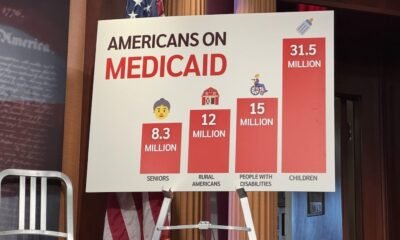cct-tracking
Millions to See Boost in Social Security Payments Thanks to Biden’s New Bill

President Joe Biden signed the Social Security Fairness Act into law on Sunday, impacting nearly 3 million current and former public employees. This legislation is designed to enhance Social Security payments for those who served as teachers, police officers, firefighters, and in other public roles. Advocates assert that this act addresses a long-standing inequality affecting public service workers.
The law aims to eliminate the Windfall Elimination Provision and the Government Pension Offset, which previously curtailed Social Security benefits for individuals receiving pensions from state or local governments. Biden emphasized that the legislation upholds the principle that hard-working Americans deserve the right to retire with dignity and financial security.
During the White House signing ceremony, he highlighted the significance of the bill, which infuses hope for improved retirement outcomes for many. “This is a big deal,” he stated, flanked by influential labor leaders and lawmakers from both parties, including the bill’s primary sponsors, Republican Senator Susan Collins and exiting Democratic Senator Sherrod Brown.
According to the Congressional Research Service, in December 2023, around 745,679 beneficiaries had reductions in their benefits due to the Government Pension Offset. Approximately 2.1 million individuals faced limitations from the Windfall Elimination Provision, greatly affecting their retirement income.
Projections from the Congressional Budget Office suggest that the elimination of these provisions could lead to significant increases in benefits. By December 2025, monthly payments for those impacted by the Windfall Elimination Provision could rise by an average of $360, while recipients affected by the Government Pension Offset might see an increase of $700.
The provisions of the new law will be effective starting January 2024, creating the necessity for back-dated payments from the Social Security Administration. However, the process for implementing these adjustments remains unclear. Questions loom about whether beneficiaries will need to take any action to receive their increased payments.
Edward Kelly, president of the International Association of Fire Fighters, expressed enthusiasm for the change, describing it as the correction of a “40-year wrong.” He noted that many surviving spouses of firefighters had been disadvantaged despite their contributions to Social Security.
Brown’s years of advocacy for this measure ended with his recent election loss, but he was recognized for his efforts at the ceremony. Lee Saunders, president of the American Federation of State, County and Municipal Employees, commended the new law as a step toward securing the benefits that public service workers have earned through their careers.
Reactions to the law have been mixed among Republicans. While Collins supported the bill, others, including Senators John Thune and Rand Paul, opposed it, arguing for a more sustainable approach to such benefits. Collins and her colleagues viewed this legislation as a crucial move to rectify what they see as an unfair aspect of federal law affecting public workers.
The implications of this law come amidst ongoing discussions about the future of Social Security, a critical issue for over 72 million beneficiaries, including retirees and disabled individuals. However, the Social Security Administration, already facing low staffing levels, may struggle with the added administrative burdens that come with implementing these policy changes.
Amid these developments, reports indicate that the Social Security trust fund is at risk of being unable to fully provide benefits starting in 2035, a concern now exacerbated by the new legislation. Earlier in his presidency, Biden had also signed the Butch Lewis Act, which was instrumental in safeguarding the pension plans of millions of union workers.
Associated Press writer Stephen Groves contributed to this report.


















